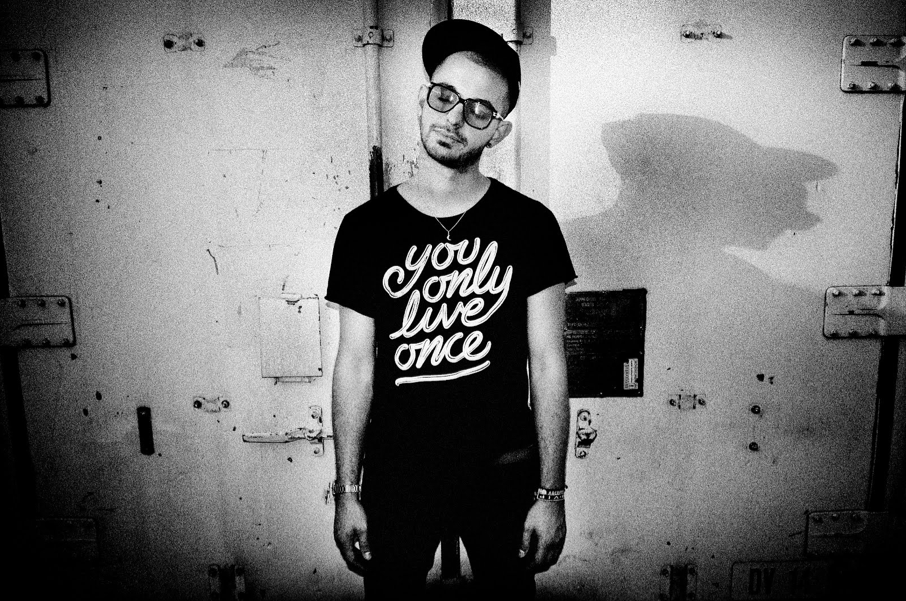This Music is By Aeroplane

IMAGE COURTESY OF ANGELS & GHOSTS
Aeroplane is Vito de Luca, who soared in 2008 on the strength of a delirious remix of Friendly Fires’ “Paris,” adding handclaps and gauzy vocals from Au Revoir Simone to the song’s indie romanticism. De Luca has a studio in his native Belgium, where he straddles the line between DJ and musician. In 2010, he played all the instruments on Aeroplane’s debut full-length, We Can’t Fly, whose release coincided with the departure of longtime collaborator Stephen Fasano from the group.
De Luca followed it up with a compilation mix, In Flight Entertainment, and also launched his own label, Aeropop. He’s put out dozens of remixes, most recently reimagining New Zealand singer Kimbra’s “Two Way Street.” We talked to De Luca about celebrity DJs, Boy Scout parties, and IKEA.
ROLAND LI: Can you talk about collaborating with Au Revoir Simone and how your remix of “Paris” came together?
VITO DE LUCA: Actually, we didn’t collaborate with Au Revoir Simone, and we had no idea even who they were. When I received a separate mix of the track, it was in the backing vocals. I just thought the girl’s voice fit way better with the instrumental that I had than the singer of Friendly Fires. We didn’t contact Au Revoir Simone to get them to re-sing. It was just there, but it’s mixed so quiet in the original record that nobody actually knew it was there.
LI: Oh wow, I didn’t know that. It seemed like that was your first real hit. How did that change the direction of the group and what impact did that have?
DE LUCA: It turned Aeroplane into a headliner. We had some hits in a certain way. We were playing in clubs. But then the “Paris” remixes turned Aeroplane into doing big festivals, playing main stages, and put us higher on the bill.
LI: Would you say it really changed your career?
DE LUCA: Yeah, definitely. It’s kind of like what “Satisfaction” did to the Rolling Stones. They were already a band before, but after “Satisfaction,” they were the Rolling Stones. “Paris” kind of put us on the map in a certain way.
LI: Yeah, absolutely. I was reading that on the first album, you were playing all the instruments and it was almost kind of a rock album, but at the same time you do a lot of DJ sets. Do you consider yourself more of a traditional musician or more of a DJ or producer?
DE LUCA: I think both are completely different things. Being a musician and being a DJ are completely unrelated things to me. When I did the Aeroplane album, I had this thing in mind. It was meant to be a live show, which didn’t happen because people who were meant to fund it ended up backing out. We didn’t have the money to finance such a big live show. I’m learning how to become a dancefloor DJ.
LI: Did you start out playing instruments or spinning records?
DE LUCA: I started playing instruments around 11 or 12. Then, I started getting sound cards and samplers. I started playing records at random parties, like Boy Scout parties.
LI: Are you working on a new album now?
DE LUCA: I’m not, but I’m planning to go back into the studio in a few months. It will be influenced by 1970s and 1980s disco and pop—that’s just what I love. I want to tour on the album and it’s expensive to get multiple singers, so I will try to sing on the songs myself.
LI: Do you have a lot of experience singing?
DE LUCA: When I was growing up studying music, I had to take choir. So I think my pitch is fine. It’s just about trying to find an identity for my voice.
LI: Do you have any thoughts on how big electronic music has gotten and the “celebrity DJ?” Is it good for the genre?
DE LUCA: I don’t think it’s bad for it. It’s good for the business that people can realize that DJs can carry a crowd and DJs can actually sell tickets. But it can detract from the music itself. When everything is synced to a giant screen, there’s way less space for improvisation and adaptation. And everybody is thinking they can become a millionaire. It’s something I could not do because deep down, I don’t think I’m like that.
LI: What would you say is your ultimate goal? What drives you to keep making music?
DE LUCA: The answer is in the question. The reason why I still make music is because that’s just what I want to do. I’m just really happy that I can make a living out of it and pay my bills with it, that I have a studio I can make more music with. I’m just planning to make music the rest of my life, which is a dream that I never would have expected to happen.
LI: It’s love of the art, I guess?
DE LUCA: Yeah, it doesn’t matter what I was doing, I would still come back home and make music. When I did “Paris” back in the day, I had a full-time job. And I did “Paris” when I was at home—I was working at IKEA. It’s always been there.
AEROPLANE PLAYS THE FIXED & VERBOTEN PARTY AT HIGHLINE BALLROOM ON OCTOBER 5. FOR MORE ON THE ARTIST, VISIT HIS WEBSITE.






